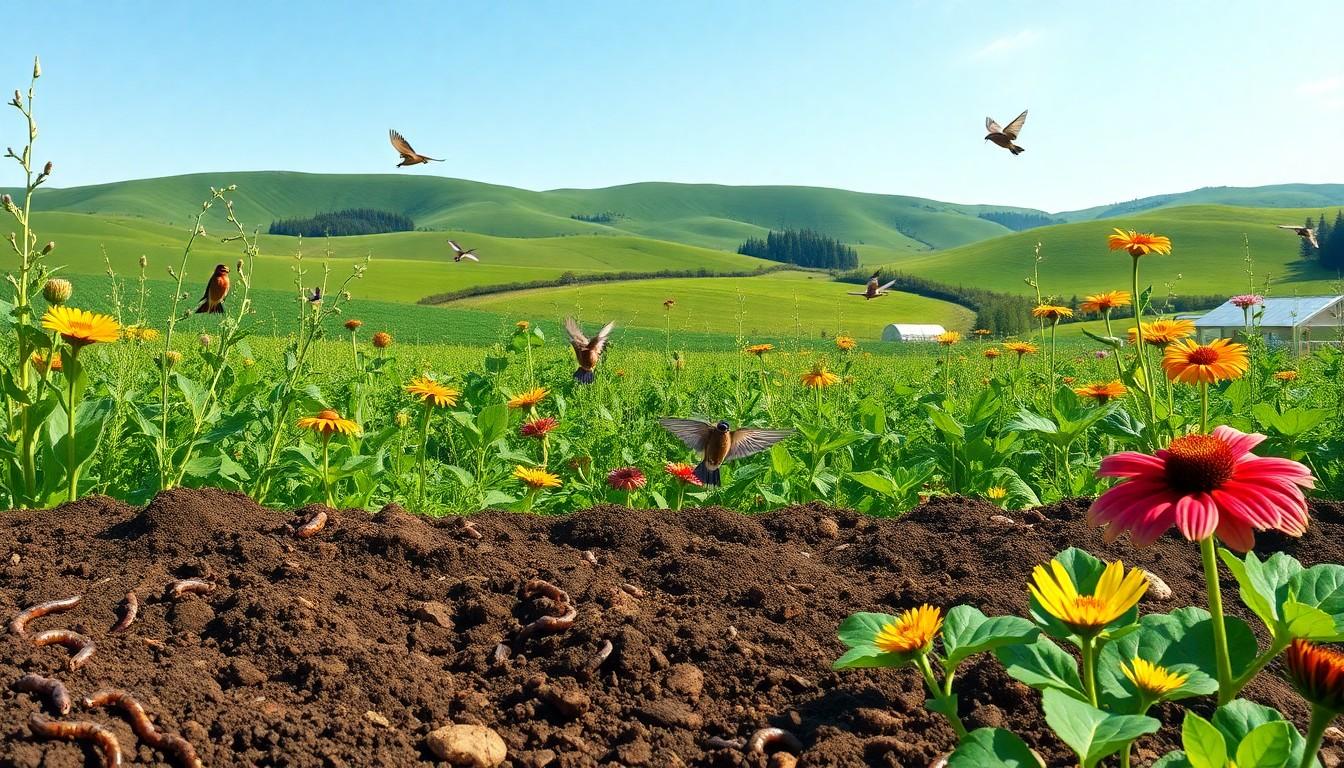In a world where the produce aisle often resembles a science experiment gone wrong, organic farming emerges as the superhero we didn’t know we needed. With its eco-friendly cape flapping in the wind, organic farming champions sustainable practices that not only nourish our bodies but also protect our planet. It’s like choosing a cozy, hand-knit sweater over a scratchy, mass-produced one—better for you and the environment!
Why Is Organic Farming Better for the Environment
Organic farming represents a holistic approach to agriculture, focusing on utilizing natural processes and materials. This method emphasizes the health of ecosystems and biodiversity.
Definition and Principles of Organic Farming
Organic farming centers around growing food without synthetic pesticides or fertilizers. Farmers use natural alternatives like compost and green manure to enrich soil. Crop rotation and polyculture enhance biodiversity and pest control. Organic practices also promote animal welfare, allowing livestock access to outdoor spaces and natural diets. Certification standards mandate these practices, ensuring consumers receive products that align with organic principles.
Comparison with Conventional Farming
Conventional farming relies heavily on chemical inputs for pest control and soil fertility. This method often leads to soil degradation and water pollution. In contrast, organic farming prioritizes sustainability and environmental health. Studies indicate that organic methods maintain higher levels of soil organic matter. While conventional farming can produce higher yields temporarily, organic farming builds long-term agricultural resilience. Organic products often contain fewer harmful residues and promote better public health outcomes.
Environmental Benefits of Organic Farming

Organic farming offers numerous advantages for the environment. These practices prioritize sustainability and harmony with natural ecosystems.
Soil Health Improvement
Organic farming boosts soil health significantly. It enhances soil structure through methods like crop rotation and cover cropping. Enriching soil with organic matter increases nutrient availability. Microbial activity thrives in organic systems, promoting a healthy ecosystem. Healthy soil sequesters carbon dioxide, mitigating climate change effects. Studies show organic methods lead to improved water retention, reducing erosion and runoff.
Biodiversity Preservation
Organic farms promote biodiversity on multiple levels. They create habitats for various species, supporting flora and fauna diversity. The absence of synthetic pesticides allows beneficial insects to flourish. Crop diversity in organic systems encourages resilience against pests and disease. Pollinators find safe refuge in these environments, crucial for food production. Research indicates organic farms typically host 30% more wildlife than conventional farms, enhancing ecosystem stability.
Water Conservation
Water conservation is a key benefit of organic farming practices. Organic methods improve soil structure, leading to better water infiltration and retention. These practices reduce the necessity for irrigation by enhancing soil moisture levels. Organic farms often utilize cover crops to minimize evaporation during dry periods. Studies confirm that organic farming can decrease water usage by up to 40% compared to conventional methods. Protecting water quality is also vital, as organic practices reduce runoff and pollution in waterways.
Reduction of Chemical Usage
Organic farming significantly reduces the use of synthetic chemicals, benefiting the environment and public health.
Pesticides and Fertilizers
Organic farming eliminates synthetic pesticides and fertilizers, relying instead on natural alternatives. Natural pest control methods, such as beneficial insects, help manage pests effectively. Compost enriches the soil without harmful residual effects often associated with chemical fertilizers. As a result, organic farms contribute to healthier ecosystems by minimizing toxic runoff. Research shows that this approach leads to a 30% reduction in pesticide detection in water sources. Pesticide-free practices ensure safer environments for both farmers and consumers, promoting a healthier food supply.
Impact on Ecosystems
Organic practices foster healthier ecosystems by enhancing biodiversity. Crop rotations and cover crops maintain soil health, supporting a robust community of microorganisms. Healthy soil improves habitat availability, promoting wildlife and beneficial insects. Studies indicate organic farms support 30% more wildlife populations than conventional farms. Reduced chemical inputs minimize harmful effects on surrounding flora and fauna, allowing ecosystems to thrive. Ultimately, organic farming leads to resilient agricultural landscapes that respond better to environmental changes.
Carbon Sequestration and Climate Impact
Organic farming significantly influences carbon sequestration and climate impact, primarily through natural practices.
Role of Organic Practices in Carbon Capture
Organic practices enhance soil health, which directly contributes to carbon capture. Utilizing techniques like cover cropping and crop rotation increases organic matter in the soil. Enhanced organic matter improves soil structure, allowing it to retain carbon dioxide. Research shows that organic soils can sequester up to 2.5 times more carbon than conventional soils. Improved microbial activity in organic systems further promotes carbon storage, leading to healthier ecosystems.
Contribution to Climate Change Mitigation
Organic farming plays a critical role in mitigating climate change effects. By avoiding synthetic fertilizers, organic methods reduce nitrous oxide emissions, a potent greenhouse gas. Organic fields maintain higher biodiversity, promoting resilience against climate variability. Additionally, studies indicate organic farms can reduce overall farm energy use by approximately 20%. Improved soil health from organic practices also enhances nutrient cycling, contributing to lower greenhouse gas emissions overall.
Economic and Social Aspects
Organic farming significantly impacts local economies and community dynamics. It creates jobs and encourages small-scale farming, bolstering local agricultural markets. Organic farms often source inputs locally, supporting regional businesses and fostering economic resilience. Studies show that organic farming generates 30% more revenue per acre compared to conventional methods. This increased profitability enables farmers to invest in their communities, driving economic growth and sustainability.
Building consumer awareness plays a crucial role in the success of organic farming. With a growing demand for organic products, shoppers actively seek healthier options free from synthetic chemicals. Increased consumer interest emphasizes transparency in food production, leading to informed choices. Organic labeling informs consumers about sustainable practices, showcasing a commitment to environmental stewardship. Research indicates that 70% of consumers prefer organic products, highlighting their willingness to invest in healthier lifestyles that contribute to a sustainable future.
Supporting a Greener Tomorrow
Organic farming stands out as a key player in promoting environmental health and sustainability. By prioritizing natural processes over synthetic inputs, it not only enhances soil quality but also fosters biodiversity. The practices employed in organic farming lead to healthier ecosystems capable of sequestering carbon and improving water retention.
As consumers increasingly demand organic products, they support a system that benefits both their health and the planet. This shift not only encourages local economies but also empowers farmers to adopt practices that yield long-term benefits. Embracing organic farming is a step towards a more sustainable future for agriculture and the environment.

